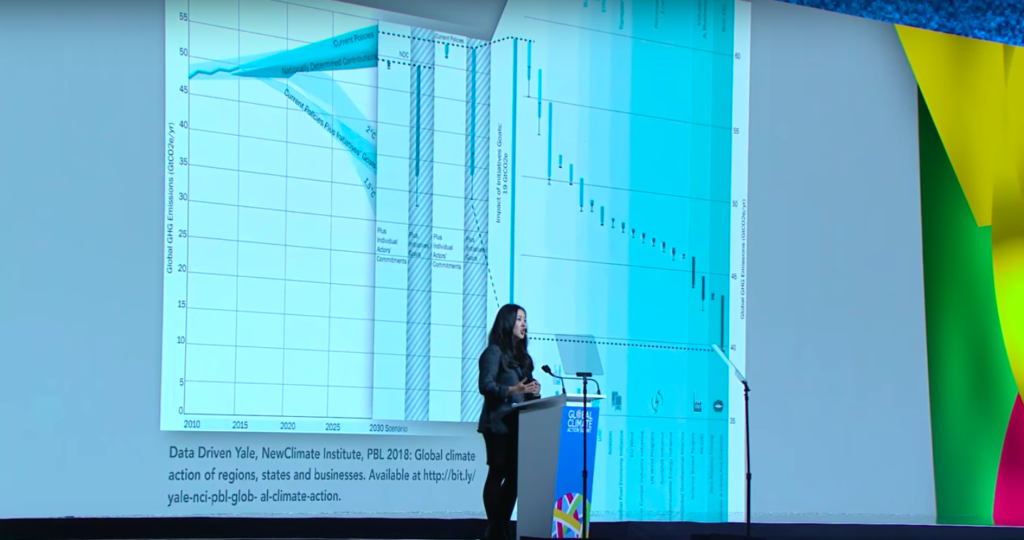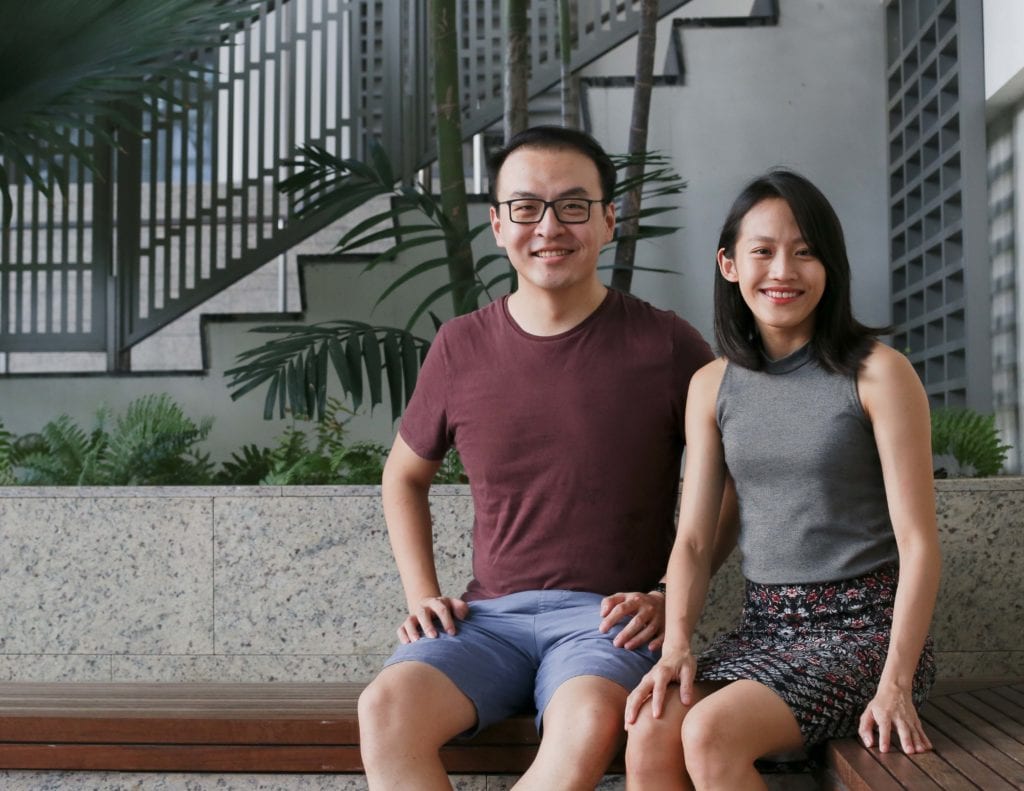Yale-NUS professor and students collaborate on global climate action policy research
Assistant Professor of Social Sciences (Environmental Studies) Angel Hsu recently co-authored a report urging national governments to step-up cooperation with subnational entities to fight climate change.
The report, titled ‘Global climate action of regions, states and businesses,’ was part of a collaborative series of reports by over 30 organisations released during the 2018 Global Climate Action Summit.
Two other members of the Yale-NUS community – Xie Yihao (Class of 2017) and Yeo Zhi Yi (Class of 2020) – were also part of the research team that worked on this report.
Published by Data-Driven Yale, the report had some hard-hitting results after examining the contribution of regions, cities and businesses, and of cooperative initiatives among these entities along with national governments and civil society partners.
 Dr Hsu presenting at the Global Climate Action Summit. Image provided by Angel Hsu.
Dr Hsu presenting at the Global Climate Action Summit. Image provided by Angel Hsu.
Dr Hsu is the founder and director of Data-Driven Yale, a multidisciplinary research team of policy researchers, data scientists, programmers and visual communicators. Her research explores the intersection of science and policy and the use of data-driven approaches to understand environmental sustainability, particularly in the areas of climate change, energy, urbanisation and air quality.
Yihao began working at Data-Driven Yale after he graduated from Yale-NUS College while Zhi Yi was involved through the Summer Research Programme offered by the Centre for International & Professional Experience (CIPE), an office at Yale-NUS that provides experiential and global learning opportunities to students.
While most scholarship has focused on the roles of governments and civil society, this report sought to understand the contributions of regions, cities and businesses to national and global efforts to reduce greenhouse gas emissions, and prevent the most damaging impacts of climate change.
The report found that while the smaller entities are taking climate-related actions that are leading to significant additional climate emission reductions, these efforts alone cannot fully deliver the goals set out in the Paris Agreement. Signed by 195 countries in 2015, the agreement’s main aim is to keep a global temperature rise this century below 2 degrees Celsius above pre-industrial levels, and to drive efforts to limit the temperature increase even further to 1.5 degrees Celsius.
“We still need national governments to increase their ambition and work together with these non-state and subnational actors,” Dr Hsu said.
Dr Hsu noted that Yihao and Zhi Yi were instrumental in completing the project.
 Xie Yihao (left) also worked on the report, is currently on the Concurrent Degree Programme with the Yale School of Forestry & Environmental Studies. Image by Yale-NUS College.
Xie Yihao (left) also worked on the report, is currently on the Concurrent Degree Programme with the Yale School of Forestry & Environmental Studies. Image by Yale-NUS College.
“They provided a lot of support in data collection, cleaning, coding and modelling. They were critical in helping to compile, clean and code data using the statistical software, R, and putting their hard-learned Quantitative Reasoning (a Common Curriculum course) and data science skills to work,” she said.
“They both also assisted in data analysis and visualisation – many of the figures in the report were designed and coded by them.”
Yihao said he became involved with Professor Hsu’s research because she was his capstone advisor. He had also taken the class ‘Climate Change Science and Policy’ with her in his final year.
“As I learned more about her work, I became more interested in the type of data-driven environmental policy research that she does,” he said.
Yihao worked on the project as a Research Associate while waiting to enter the Concurrent Degree Programme (CDP) with the Yale School of Forestry & Environmental Studies (YFES), of which he is part of the inaugural cohort. As part of the curriculum, students on this CDP are required to work for a year before beginning their final year of education.
While he had some prior experience with using R, Yihao realised on the job that real-world research was quite different from what the classroom had prepared him for.
“I still had to learn many things on the job. For that to happen, I am most thankful for the ability to think critically, learn fast and communicate effectively, which are abilities cultivated and tested at Yale-NUS throughout the four years,” he said.
One of Zhi Yi’s greatest takeaways from the Summer Research Programme was “learning and seeing how data science can and has been applied to analyse environmental policy and influence policy decisions”.
“Before undertaking this research project, I had interests in both environmental policy and data science but I did not have a clear idea on how to marry the two,” he said. “Now, I have a much clearer picture of how this can be done and this has very much shaped the way I approach environmental problems and projects.”
For Zhi Yi, who has taken both Environmental Studies and Computer Science classes, the emphasis on inter-disciplinary learning at Yale-NUS has allowed him to “explore different topics and find synergies within them,” which helped him to better approach the challenges he faced.
“The courses that I took at Yale-NUS equipped me with the Environmental Science knowledge and Mathematical, Computational and Stastistical Sciences skills for the projects I worked on with Dr Hsu,” he said.
Like Yihao, Zhi Yi is interested in pursuing the CDP with YFES to pursue a Master’s degree after his undergraduate education at Yale-NUS College.
“I am definitely interested to continue using data science to study and influence environmental policymaking, especially marine policy and conservation,” he shared.
On what actions individuals can take to support climate action, Dr Hsu noted that one way is to “engage governments by writing letters, op-eds expressing why they should care about climate change and how they can take specific action.”
“There’s also a huge movement in microlending for climate-change related projects – supporting some of these or volunteering with local organisations focused on climate change are other ways to send a signal,” she said.
Apart from publishing this report, Dr Hsu also recently gave a TED talk titled “How China is (and isn’t) fighting pollution and climate change” at the TED 2018 conference. She was also awarded a grant of $500,000 for the National University of Singapore Young Investigator Award to continue her climate action research for the next three years.





